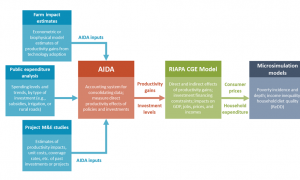book chapter
global food policy report
|
2022
| by Jemimah Njuki, Samuel Benin, Wim Marivoet, John M. Ulimwengu, Caroline Mwongera, Clemens Breisinger, Amgad Elmahdi, Yumna Kassim, Nicostrato D. Perez, Kamiljon T. Akramov, Kahramon Djumaboev, Roman Romashkin, Aditi Mukherji, Avinash Kishore, Shahidur Rashid, Kevin Z. Chen, Yue Zhan, Eugenio Diaz-Bonilla, Carolina Navarrete-Frias and Valeria Piñeiro
Climate change is a truly global threat, but its impacts differ around the world. Regions and countries urgently need to identify and implement policy responses that reflect local needs and opportunities.


